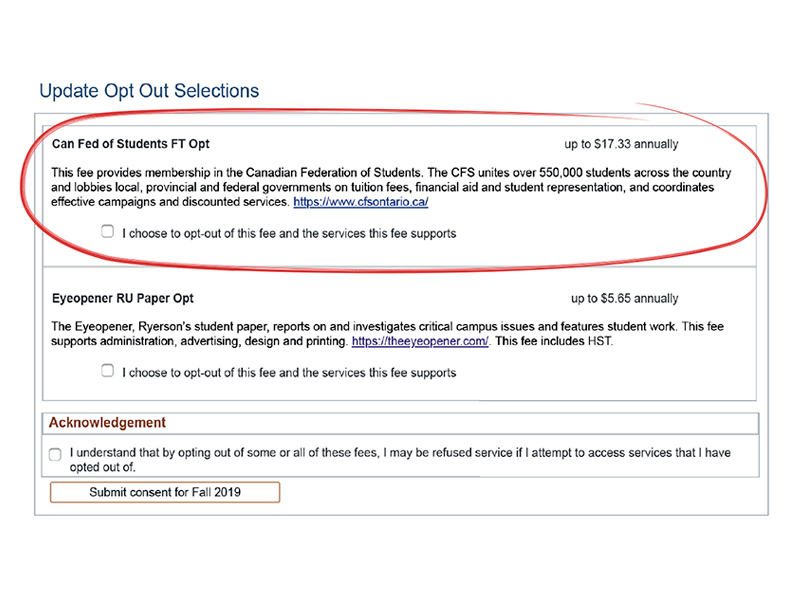An Ontario court has struck down the provincial government’s Student Choice Initiative, which made the payment of “ancillary” student fees optional, ruing that the policy goes beyond the province’s jurisdiction.
In a unanimous three-judge decision, the Ontario Superior Court of Justice Divisional Court found that universities and their respective student associations are autonomous organizations that have the ability to negotiate the collection of fees from students, outside of interference from the provincial government.
“Universities are private, autonomous, self-governing institutions. They are ‘publicly assisted’ but not publicly owned or operated. For more than 100 years, Ontario has had a legislated policy of non-interference in university affairs, reflected in private legislative acts conferring on university governing councils and senates the authority and responsibility to manage university affairs,” the court ruled.
“There is no statutory authority authorizing cabinet or the minister to interfere in the internal affairs of universities generally, or in the relations between universities and student associations specifically.”
The case arose out of a legal challenge to the Student Choice Initiative that was launched by the York Federation of Students (YFS) and the Canadian Federation of Students (CFS).
They opposed the provincial policy, which came into effect in March, in which the cabinet instructed the minister of training, college and universities to direct colleges and universities to allow students to opt out of “fees related to student associations” and other “ancillary fees.”
The fees at the heart of the dispute support clubs, students societies and other non-essential programs, but don’t include athletics and recreation programs, career services or health and counselling services.
The League for Human Rights of B’nai Brith Canada intervened in the case in support of the policy, arguing that students should have the freedom “to decide not to support their student associations,” the court recounted.
READ: B’NAI BRITH INTERVENES IN STUDENT UNION LAWSUIT
Addressing the B’nai Brith’s arguments, the court stated that, “This may be a policy argument in favour of the impugned directives but it does not provide a legal basis for them. The wisdom of the impugned directives is not before us, and political arguments, such as the one advanced by B’nai Brith, cannot be used to overcome the legal argument advanced by the applicants (CFS and YFS).”
The student organizations reacted with glee at the court’s ruling, running a pink graphic on their Facebook pages with the words “We won” prominently displayed.
“We took the government to court and won!” the organizations proclaimed.
“Students have spent months fighting this attack on student organizations. From the streets, to the courtroom, the students united, will never be defeated,” the CFS stated.
“Doug Ford’s attempt to wipe out students’ unions under the guise of giving students ‘choice’ has been exposed for what it really was: an attempt to silence his opposition,” said Kayla Weiler, a CFS representative, in a news release.
Jenessa Crognali, the press secretary for Attorney General Doug Downey’s office, said the ruling is being reviewed.
“As this matter is in the appeal period, it would be inappropriate to comment,” she said.
Michael Mostyn, the CEO of B’nai Brith Canada, said in a news release that, “We strongly disagree with this decision and hope the government appeals. B’nai Brith will intervene again if it does.
“There may also be a legislative solution to ensuring that Jewish students are no longer obligated to self-discriminate against themselves through mandatory student union dues, and we will be sharing our further thoughts in this regard with the Government of Ontario.”
Lawyers David Elmaleh and Aaron Rosenberg, who represented B’nai Brith in the case, noted that not all Jewish students felt comfortable paying the fees.
“As an intervenor in this case, B’nai Brith Canada sought to raise the voices of Jewish and pro-Israel students in light of student unions’ troubling programming and policies against these students’ interests,” the two lawyers wrote in a statement.
The Centre for Israel and Jewish Affairs (CIJA), which did not intervene in the case, highlighted why some students would want to opt out of paying the fees.
“It is telling that the groups initiating the judicial review – like the York Federation of Students and the Canadian Federation of Students – include those at the centre of anti-Israel and anti-Semitic activity on campus, including intimidation, disruption and even violence,” said Noah Shack, CIJA’s vice president for the Greater Toronto Area.
“In the week leading up to the court decision, a representative of the YFS promoted on social media the disruptive, violent protests targeting a program run by a Jewish student club. A few days before, a representative of the University of Toronto Graduate Students Union refused to support access to kosher food on campus because of Hillel University of Toronto’s Zionist identity.
“In the face of appalling incidents like these, students in Ontario deserve the right to choose which student organizations they fund with their tuition dollars. Student unions and the specific initiatives they fund need more accountability, not less.”
